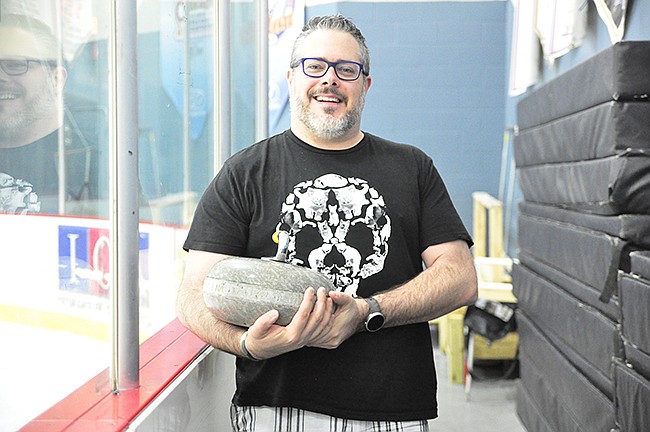- April 4, 2025
-
-
Loading

Loading

Somewhere around Feb. 16, 2010, Bryan Pittard fell in love with a sport many Floridians may never have heard of. The 21st Winter Olympic Games was on TV, and the Canadians were well on their way to picking up silver and gold in curling.
“Winter sports were just an odd thing I’d read about,” the Florida native said. Curling may have been the oddest.
But the obscure sport that pops up into the public consciousness every four years or so slid into Pittard’s noggin with all the impact of a well-placed stone.
To Pittard, it looked like a ballet on ice. Others call it chess. The thrower glides a smooth, puck-shaped granite stone weighing nearly four times as much as an average bowling ball, releasing it gently forward as two sweepers skate alongside holding specialized brooms, silently drifting in concert toward a target down a long runway of ice. The bull’s eye waiting at the other end is the goal; stop your stones closest to the middle and win points. It starts with silent precision, a subtle twist of a wrist, then ends in a dramatic flurry of sweeping as the stone slams into another one or skids to a stop.
“It really caught me,” Pittard said. “Nothing had ever caught me like that. I thought ‘I can do this, and I really want to.’”
The local climate issue was immediately obvious. Back in the early 1500s, on a frozen lake in Scotland, the idea of a sort of ice-cold bocce ball tournament first took hold somewhere south of 32 degrees Fahrenheit. Before the advent of air conditioning, that’s only when it was played, as the sport spread across countries where water turns oddly solid sometime around the holiday season.
Pittard, raised in South Florida, has never lived anywhere but the Sunshine State. Before August of this year, he’d only been on ice twice.
“And I did pretty badly,” he said.
He went to the Panther Curling Club in Coral Springs, then the Potomac Curling Club near Washington, D.C. to get his first chance sliding a stone. A low stance on slippery ice kept falls to a minimum, and that choreographed elegance he’d seen on screen was now delivered through his own two hands. He wanted to do more of this.
But driving across the state — or the country — every time he wanted to slide a rock across the ice wouldn’t work forever. His sport needed a home closer to his own.
By the end of 2014, the Orlando Curling Club was on the grow. But starting your own sports club from scratch can get expensive. Stones are $400 to $800 each, and most clubs have 50 or more, Pittard said.
“You’re looking at tens of thousands of dollars to get a club going,” he said. His search went nationwide looking for help.
And while that search went on, the club grew.
Jordan Cuoco, who had been interested in curling for a decade, came on board and gave the Club a big boost, Pittard said. He pushed social media to get the word out, and helped get in touch with other clubs.
The Orlando Curling Club is hosting a Learn to Curl event from 4 to 6:45 p.m. Saturday, Sept. 19, at RDV Sportsplex Ice Den, 8701 Maitland Summit Blvd., Orlando. It’s $40 per person. All equipment is provided. Visit curlingorlando.com for more information.
Jane Cavanaugh, who had been curling in New York since 1995, knew a thing or two about the sport when she signed on to be a board member of the club. She’d been looking for a way to get back into the sport ever since moving down to Florida 10 years ago, and she’d seen Orlando’s attempt at a club fizzle before. But this time was different, attracting attention early from northern expats and curious newcomers.
“People from all lifestyles come together to do this,” she said.
But they have one unifying trait: love of an obscure sport that’s as cool as ice and as laid back as a beach day in the Sunshine State.
“Curling is a very congenial sport,” Cavanaugh said. “There’s no arguing, no cheating.”
At the end of June, Pittard was standing in a basement looking at a sheet of 12 used stones from the Atlanta Curling Club. If he made the drive, they said, the rocks were his. Then came the mad dash for more equipment, some bought on the cheap, others built from scratch — they scribe their scoring circle using a wooden 2x4 — but most of it is donated.
“The community behind curling is so great,” Cuoco said. “Ninety percent of our equipment has been donated. They really want this sport to grow.”
The Club still had to find a home, preferably a very cold, very large building. Before long, the choice was obvious. At RDV Ice Den in Maitland, the Club wouldn’t have to drive to Kissimmee (the next closest available ice rink), and had a willing partner with RDV’s Debby Kwasman, who Pittard said was “really excited” to see curling at the Ice Den.
Hot Central Florida had its place to curl.
In August, the club hosted its first Learn to Curl day, which sold out.
“Everybody who came out either used to do curling up north, or saw it on the Olympics,” Pittard said.
Now the club is doing it again. On Sept. 19, they’re inviting would-be curlers out to see what it’s like for themselves. Pittard is hoping to pack the ice again, as curling heats up in its unusual home.
“I come in here from 90 degree weather, and it’s 50 degrees in here and even colder on the ice,” Pittard said, his breath fogging just outside the rink. “It’s not a natural fit, but it’s a good fit. It’s weird for sure.”